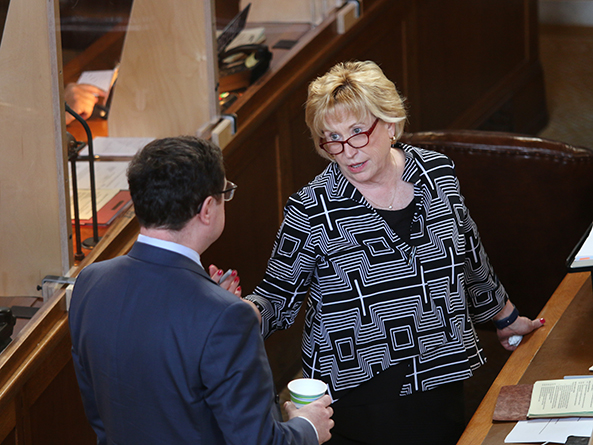Corporate tax cut, other revenue measures advanced
After two days of discussion, lawmakers gave first-round approval April 27 to a bill that includes several tax-related proposals, including a cut to Nebraska’s top corporate income tax rate.
The Revenue Committee introduced LB432 as a placeholder bill. A committee amendment would have replaced it with the provisions of five other bills heard by the committee this session.
Omaha Sen. John Cavanaugh made a motion to divide the question and consider the various provisions as separate amendments. The motion carried.
One amendment, adopted 30-7, contained the provisions of LB680, introduced by Sen. Lou Ann Linehan of Elkhorn. They would cut the state’s top corporate income tax rate to 6.84 percent — the same as the state’s top individual income tax rate — beginning Jan. 1, 2022.
Corporations currently pay a state income tax rate of 5.58 percent on the first $100,000 of taxable income and 7.81 percent on income in excess of that amount.
Linehan said the change would make Nebraska’s top rate more competitive with those of neighboring states. This would help reduce the state’s reliance on tax incentive programs to encourage those businesses to locate and expand here, she said.
The state Department of Revenue estimates that Linehan’s proposal would reduce general fund revenue by $5 million in fiscal year 2021-22, $20 million in FY2022-23 and $36 million in FY2023-24.
Sen. Curt Friesen of Henderson introduced an amendment during floor debate April 26 that would eliminate the rate cut. He said the Legislature’s priority this year should be property tax relief and that lawmakers could examine corporate tax rates in a comprehensive tax reform effort next session.
North Platte Sen. Mike Groene supported Friesen’s amendment, saying corporations will continue to do business in Nebraska regardless of the corporate tax rate. He said the main reason companies choose not to locate in Nebraska is a lack of workers.
“Cutting that tax on corporations will not bring one more company here,” Groene said.
Friesen’s amendment failed on a vote of 23-23. Twenty-five votes were needed.
A second component of the divided committee amendment contained provisions of LB299 and LB564, both introduced by Omaha Sen. Mike McDonnell. It was adopted on a vote of 35-0.
Under the provisions of LB299, any rural or suburban fire protection district, airport authority, city, village or nonprofit corporation could provide and maintain enhanced cancer benefits for paid and volunteer firefighters, the combined total of which would not exceed $50,000 in the firefighter’s lifetime.
Beginning Jan. 1, 2022, an individual’s federal adjusted gross income would be reduced by the amount received by or on behalf of a firefighter for cancer benefits under the act. McDonnell said this would ensure that the benefits are not subject to state income tax.
Under the provisions of LB564, Nebraska Education Savings Plan trust accounts could be used to pay for the cost of certain apprenticeship programs.
Sen. Robert Clements of Elmwood supported the measure, saying it would help address a shortage of workers in the trades.
A third amendment, adopted 34-2, included the provisions of LB597, introduced by Sen. Joni Albrecht of Thurston.
The provisions would create a $2,000 refundable state income tax credit for the parent of a stillborn child if a fetal death certificate is filed for the child, the child had advanced to at least the 20th week of gestation and the child would have been a dependent of the individual claiming the credit.
The department estimates that the provisions would reduce general fund revenue by approximately $300,000 each year beginning in fiscal year 2022-23.
Albrecht said the credit would help families who experience a stillbirth to pay for hospital and funeral expenses.
Omaha Sen. Megan Hunt opposed the measure, saying it is intended to create a legal precedent that grants personhood to the unborn. A better way to assist families in that situation would be to provide paid medical leave, she said.
Sen. Machaela Cavanaugh of Omaha said the credit would not provide immediate help because parents would not receive it until after filing their taxes the following year. Additionally, she said, the proposal is unclear about which parent could claim the credit.
A final amendment included the amended provisions of LB347, sponsored by Omaha Sen. Brett Lindstrom, which deal with a category of income earned by U.S. multinational corporations.
The 2017 Tax Cuts and Jobs Act created a provision to tax Global Intangible Low-Taxed Income, a certain type of income earned by foreign subsidiaries of U.S. corporations. The tax is meant to discourage multinational corporations from shifting profits to jurisdictions with tax rates lower than the 21 percent U.S. corporate rate.
Lindstrom’s proposal would allow Nebraska taxpayers to exclude GILTI from state income tax. He said surrounding states offer a full or partial tax exclusion for that income.
The department estimates that the change would reduce general fund revenue by $8.9 million in FY2021-22, $11.6 million in FY2022-23 and $11.5 million in FY2023-24.
Sen. John Cavanaugh opposed the provision, saying corporations avoided paying federal and state taxes on that income in the past only through “creative bookkeeping.”
“This does not benefit us to adopt this cut,” he said. “This is money that we’re giving away that we could use for something else for no reason other than these companies want it.”
Linehan later withdrew the amendment, citing the proposal’s cost and the limited funds available this session for bills that reduce tax revenue.
Senators then voted 41-1 to advance LB432 to select file.


